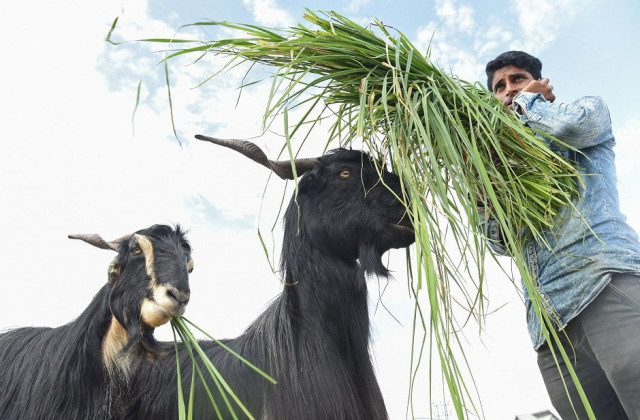Unchecked livestock: A veterinary emergency hides in plain sight
With Eidul Azha around the corner, Sindh has issued a Congo virus advisory

The advisory, issued by Sindh’s director general health under federal health department directions, informs citizens that the main vectors of the virus are the skin, blood and waste of sacrificial animals. PHOTO: AFP
At present, there are 13,636 veterinary doctors, 963 veterinary hospitals, 2,869 veterinary dispensaries and 19 institutes that offer five-year Doctor of Veterinary Medicine (DVM) programmes across the country, according to Pakistan Veterinary Medical Council (PVMC) and data obtained from other sources.
High steaks: Cows go from roofs to plates in Pakistan for Eid
However, as with several other sectors, most of these resources are concentrated in Punjab: the province is home to 530 veterinary hospitals, 1,213 veterinary dispensaries and 1,713 veterinary centres. While Sindh has around 5,000 qualified veterinary doctors, it has only 119 veterinary hospitals, 60 veterinary dispensaries and 608 veterinary centres. The province also has just two government universities that offer DVM programmes, namely the Sindh Agriculture University (SAU) Tando Jam and the recently built Shaheed Benazir Bhutto University of Veterinary and Animal Science (SBBUVAS) in Sakrand.
To make matters worse, a source in SAU Tando Jam said that although the university alone produces 300 veterinary doctors every year, most of them are unable to find jobs in the province.
“There is no laboratory for students at SAU and clinical practice is not part of their coursework,” complained veterinary doctor Zamir Khanzada. “The university does not operate a veterinary hospital and there are no veterinary clinics in Tando Jam so SAU students do not get a chance to do a house job as well.”
“Sindh government is ignoring the veterinary sector altogether,” lamented veterinary doctor Irshad Abbasi. “Take for instance the foot and mouth disease situation in the province which could at any moment turn into a crisis. But the relevant provincial department continues to be quiet.” “There are more than 1,500 veterinary doctors without jobs in the province,” Abbasi pointed out. “Because they are unemployed, come every Eidul Azha they open up these small clinics and start administering antibiotics carelessly.”
Talking about veterinary facilities in Karachi, Khanzada said the three hospitals in city lacked necessary equipment to treat animals. But the province is not alone, he stressed. “Due to government negligence, the entire veterinary apparatus in the country is virtually inactive.”
“Right now, there is no government institute that offer postgraduate programmes and research opportunities to veterinary doctors,” added Abbasi.
Other provinces fare even worse than Sindh, according to data available with The Express Tribune. Khyber-Pakhtunkhwa has just 98 veterinary hospitals, 363 veterinary dispensaries and 218 veterinary dispensaries while Balochistan has only 116 veterinary hospitals and 783 veterinary dispensaries.
Besides the dearth of veterinary facilities and professionals in Sindh and the rest of Pakistan, the country does not currently have a registration and identification system for animals. According to sources, due to lack of vaccination, many livestock animals across the country are unable to withstand harsh weather conditions and contract various diseases while being moved from one province to another.
This risk increases manifold in the run-up to Eidul Azha, when livestock animals meant for sacrifice are moved across provinces and into metropolises like Karachi. Since no medical checkups on animals are carried out during this process, the chances of an infected animal transmitting disease to other animals and consequently to people who come in contact with them rise exponentially.
The lack of any veterinary standard operating procedures and arrangements is one reason why scores of people lose their lives to animal-borne diseases like the Congo virus every year.
Due to the dearth of veterinary facilities, both the federal and provincial governments have asked citizens to adopt precautionary measures when dealing with animals this Eid.
The Sindh government, in particular, has issued an advisory to inform citizens of measures they can take to protect themselves the Congo virus.
Unauthorised cattle markets spring up in Pindi
The advisory, issued by Sindh’s director general health under federal health department directions, informs citizens that the main vectors of the virus are the skin, blood and waste of sacrificial animals.
It warns that the main symptoms of the disease are not immediately apparent. Urging maximum caution, it advises citizens to avoid direct contact with animals and people who are infected.
The advisory recommends that citizens wear masks and dress in clothes made of soft fabric while purchasing animals for Eid. It advises citizens to make these purchases during the day.
Published in The Express Tribune, August 8th, 2019.



















COMMENTS
Comments are moderated and generally will be posted if they are on-topic and not abusive.
For more information, please see our Comments FAQ